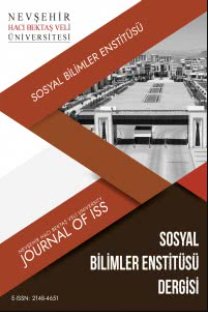ZORUNLU DENETİM FİRMASI ROTASYONU: TÜRKİYE’DEKİ DENETÇİLERİN ALGILARI ÜZERİNE BİR ARAŞTIRMA
Denetim, Denetçi, Zorunlu denetim firması rotasyonu
MANDATORY AUDIT FIRM ROTATION: EVIDENCE FROM TURKISH AUDITORS’ PERCEPTIONS
Audit, Auditor, Mandatory audit firm rotation,
___
- Cameran, M., Francis, J. R., Marra, A., & Pettinicchio, A. (2015). Are there adverse consequences of mandatory auditor rotation? evidence from the Italian experience. Auditing: A Journal of Practice & Theory, 34(1), 1–24. https://doi.org/10.2308/ajpt-50663
- Choudhury, F. (2017). Independent regulatory board for auditors consultation paper: mandatory audit firm rotation [Personal communication].
- Coyle, D. (2010). Audit firm rotation—its impact on auditor independence: an irish perspective [Dissertation of MA in Accounting]. Letterkenny Institute of Technology.
- Ewelt-Knauer, C., Gold, A. H., & Pott, C. (2012). What do we know about mandatory audit firm rotation? Institute of Chartered Accountants of Scotland.
- General Accounting Office (2014). Mandatory audit firm rotation study. https://www.gao.gov/products/gao-14-343sp
- Harber, M., & Maroun, W. (2020). Mandatory audit firm rotation: A critical composition of practitioner views from an emerging economy. Managerial Auditing Journal, 35(7), 861–896. https://doi.org/10.1108/MAJ-09-2019-2405
- Harber, M., Marx, B., & De Jager, P. (2020). The perceived financial effects of mandatory audit firm rotation. Journal of International Financial Management & Accounting, 31(2), 215–234. https://doi.org/10.1111/jifm.12115
- Jackson, A. B., Moldrich, M., & Roebuck, P. (2008). Mandatory audit firm rotation and audit quality. Managerial Auditing Journal, 23(5), 420–437. https://doi.org/10.1108/02686900810875271
- Lennox, C. (2014). Auditor tenure and rotation. In The Routledge companion to auditing (p. 18).
- Nunnally, J. C. (1994). Psychometric theory. Tata McGraw-hill education.
- Onwuchekwa, J. C., Erah, D., & Izedonmi, F. (2012a). Mandatory audit rotation and audit independence: survey of Southern Nigeria. Research Journal of Finance and Accounting, 3(7), 78–86.
- Onwuchekwa, J. C., Erah, D. O., & Izedonmi, F. (2012b). Mandatory audit rotation and audit quality: survey of Southern Nigeria. Research Journal of Finance and Accounting, 3(8), 70–77.
- Özger, S., & Tuğay, O. (2020). Bağımsız denetimde zorunlu rotasyonun denetçi bağımsızlığı ve denetim kalitesine etkisi ve rotasyon ile denetim kalitesi arasındaki ilişkide denetçi bağımsızlığının aracılık rolü: bağımsız denetçilerin algılarına yönelik bir araştırma. Muhasebe ve Finansman Dergisi, 87, 33–52. https://doi.org/10.25095/mufad.756186
- Rong, Q. (2017). Mandatory Audit firm and audit partner rotation. University of New Hampshire.
- Said, K. M. (2014b). Mandatory audit firm rotation and audit costs: a survey of auditing firms in Bahrain. Journal of Finance and Accounting, 2(6), 116. https://doi.org/10.11648/j.jfa.20140206.11
- Said, K. M., & Khasharmeh, H. (2014a). Auditors perceptions on impact of mandatory audit firm rotation on auditor independence Evidence from Bahrain. Journal of Accounting and Taxation, 6(1), 1–18. https://doi.org/10.5897/JAT2013.0127
- Shafie, R., Wan Hussin, W. N., Yusof, M., & Md Hussain, M. H. (2009). Audit firm tenure and auditor reporting quality: evidence in Malaysia. International Business Research, 2(2), 99–109.
- Tuan, K. (2019). Bağimsiz deneti̇m fi̇rmasi rotasyonu ve deneti̇m kalitesi̇. Audit Firm Rotation And Audit Quality, 37(4), 703–719. https://doi.org/10.17065/huniibf.481665
- Turel, A., Genç, M., Özden, B., & Taş, N. (2017). Audit firm tenure and audit quality implied by discretionary accruals and modified opinions: Evidence from Turkey. Acta Universitatis Danubius. ØEconomica, 13(1), 187-196.
- Yayın Aralığı: 4
- Başlangıç: 2011
- Yayıncı: Nevşehir Hacı Bektaş Veli Üniversitesi
YURT DIŞI OYLAR VE SİYASİ PARTİLERİN ULUS-ÖTESİLEŞMESİ
EVLİLİK DOYUMU ÖLÇEĞİ’NİN GELİŞTİRİLMESİ: GEÇERLİK VE GÜVENİRLİK ÇALIŞMASI
N. Büşra AKÇABOZAN KAYABOL, Pınar ÇAĞ, Ufuk AKBAŞ, Zeynep HATİPOĞLU SÜMER, Yaşar ÖZBAY, Gökçen AYDIN, Nurten KARACAN ÖZDEMİR, Cemre ERTEN TATLI, Esra EKER DURMUŞ
ULAŞTIRMA SEKTÖRÜNDEKİ ENERJİ TÜKETİMİ, EKONOMİK BÜYÜME VE ÇEVRESEL KALİTE İLİŞKİSİ
NÜFUS DEFTERLERİNE GÖRE ENEGİ (KAYMAKLI)
YARATICI SINIFIN (AR-GE ÇALIŞANLARININ) ÇALIŞMA HAYATLARINA İLİŞKİN DUYGULARI: STRES, KORKU/KAYGI
Mehmet CANSIZ, Neval KARANFİL, Ferda KERVANCI ÜSTÜN
ÖĞRENİLMİŞ ŞİDDET: EDWARD BOND'UN THE CHILDREN ADLI OYUNUNUNDA BANDURA'NIN SOSYAL ÖĞRENME KURAMI
TÜRKİYE’DE ORGANİZE SANAYİ BÖLGELERİNİN YEŞİL DÖNÜŞÜMÜ: YEŞİL ORGANİZE SANAYİ BÖLGESİ PROJESİ
BOĞAZ KELİMESİ ÜZERİNE BİR ARAŞTIRMA
Muhammed Emin YILDIZLI, Burcu YILMAZ
UZAKTAN EĞİTİM SÜRECİNDE KARŞILAŞILAN SORUNLARA İLİŞKİN ÖĞRETMEN GÖRÜŞLERİ
